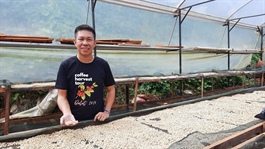Shrimp exporters plan strategies to boost year-end growth
Shrimp exporters plan strategies to boost year-end growth
Vietnamese shrimp exporters are devising competitive pricing strategies and long-term risk-hedging contracts to achieve their year-end growth targets in the last four months, the peak season for the seafood industry.

According to the Vietnam Association of Seafood Exporters and Producers (VASEP), Vietnam's shrimp exports reached their highest value of the year in August, totalling $380.3 million, a 30.2 per cent increase compared to the same period last year.
Businesses reported a strong rebound in shrimp exports in the second quarter, implementing competitive pricing strategies and risk management practices to tap into new markets such as Canada, the UK, the US, and China, while continuing to serve traditional markets like Japan and South Korea.
Bien Viet Nhu, CEO of South Vina Shrimp (SVS), told VIR, "Our exports grew by 6.8 per cent, and we saw a 3.8 per cent increase in the second quarter compared to the same period in 2023. Our key growth markets are Canada, which surged by 46.2 per cent, and China, which grew by 16.8 per cent, despite China not being a primary market for SVS. The entire EU bloc grew by 12.6 per cent, although the growth was uneven."
He attributed the recent surge in exports to government policies in various countries that have stabilised economies, curbed inflation, and reduced unemployment amid the global economic crisis, leading to a resurgence in consumer demand in certain markets.
"In the last five months of the year, SVS will remain focused on our traditional key markets such as Japan, South Korea, the EU, Hong Kong, and Singapore," Nhu said.
Additionally, SVS has implemented three risk management strategies to achieve its year-end growth targets. These include maintaining strong partnerships with farming regions and offering special policies for long-term suppliers to stabilise raw material supplies.
"We are also improving production control systems to reduce waste and offset rising costs. Lastly, we are working closely with local authorities on recruitment and training initiatives amid a labour shortage, as many workers have migrated to work in Ho Chi Minh City and Binh Duong,” Nhu explained.
Shrimp import demand from major countries is expected to rise at year-end. However, Vietnam’s shrimp exporters will face stiff competition, while value-added products are expected to perform better due to low stockpiles.
“Exporters will continue to face challenges such as rising sea freight costs and global conflicts. Additionally, shrimp farming in August and September will likely be affected by heavy rainfall, which could impact Vietnam’s commercial shrimp output for the remainder of the year,” said Phung Thi Kim Thu, a shrimp market expert at VASEP. “Nevertheless, companies have developed strategies, such as signing year-round contracts and increasing raw material reserves. We hope that in the final months of the year, the global economy and key export markets will show more positive signs, enabling the shrimp industry to achieve its $4 billion export target for 2024.”
Tran Be Sau, CEO of Viet Uc Seafood Corporation, shared the company’s plans and strategies for market diversification and product quality enhancement to boost exports in the second half of the year.
"Our corporation has outlined a strategy to manage the entire shrimp value chain – from controlling the supply of broodstock, producing high-tech shrimp larvae, and raising high-quality commercial shrimp, to delivering the final product. This product meets stringent criteria for cleanliness, being antibiotic-free, traceability, and offering superior colour and flavour," Sau said.
With fluctuations in exchange rates and international shipping costs, businesses have strengthened their risk prevention measures, including securing long-term contracts with logistics providers and utilising financial risk management tools to protect their profits.
Commenting on the most active export markets and potential opportunities for growth in the second half of the year, Sau said US shrimp import demand is expected to rise slightly in the third quarter to meet the year-end holiday season, despite strong price competition from countries like Ecuador and India.
"Meanwhile, the EU market has begun to recover slightly after facing challenges due to the Russia-Ukraine conflict and high prices. As a result, EU shrimp import demand is expected to increase slightly towards the end of the year, particularly for value-added products, as inventories decrease,” Sau added.

























